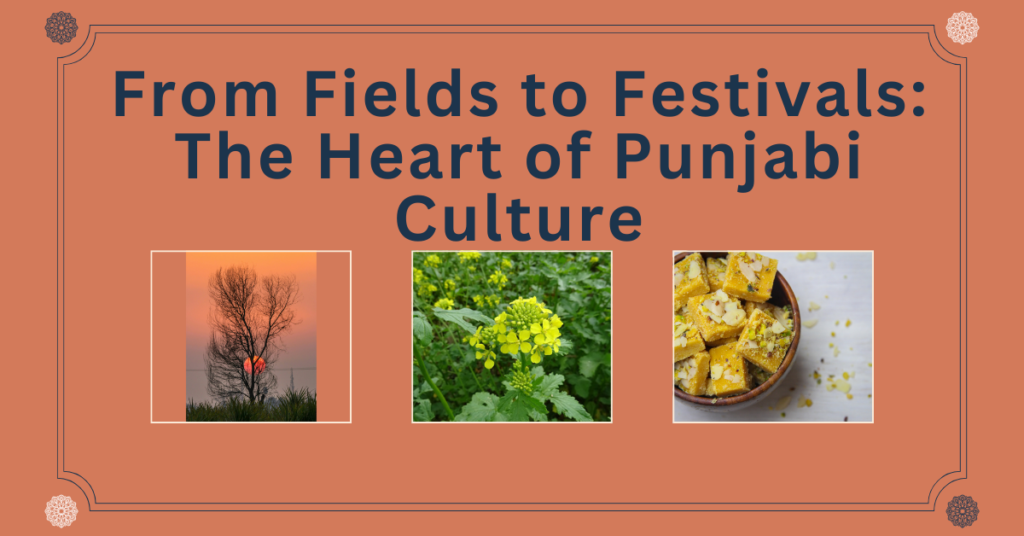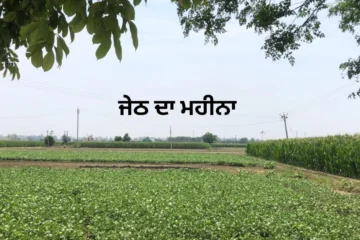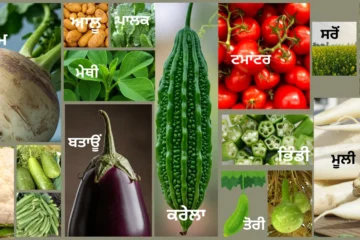
Punjab, often called the “Land of Five Rivers,” is a region in India known for its rich history, vibrant traditions, and strong cultural roots. Punjabi culture reflects the energy, warmth, and happiness of its people. The essence of Punjabi culture lies in its connection to the land, its music, food, and, most importantly, its festivals. This post will take you on a journey through the heart of Punjabi culture, exploring its close ties to farming and how its festivals bring communities together.
The Roots: Punjab and Agriculture
Punjab has always been an agricultural state. Agriculture is at the core of its economy and way of life. The fertile lands of Punjab are fed by rivers like the Sutlej, Ravi, and Beas. These lands have made Punjab the “breadbasket of India.” Wheat, rice, maize, and sugarcane are some of the major crops grown here.
Farmers, known as “Kisaan,” play an essential role in Punjab’s culture. They wake up early to tend to their fields, working hard to grow crops. Farming is not just an occupation here; it is a lifestyle passed down from generation to generation.
The farming community in Punjab holds high respect in society. Their hard work and determination are honored in songs, stories, and festivals. Farming is a symbol of prosperity in Punjab, and the state’s agricultural success is a point of pride for its people.
Baisakhi: The Festival of Harvest
One of the most important festivals in Punjab is Vaisakhi, celebrated in April. It marks the beginning of the harvest season, especially for wheat. For farmers, this is a time to reap the rewards of their hard work.
The day starts with prayers in gurudwaras (Sikh temples), thanking God for the abundant harvest. Afterward, the fields come alive with the sounds of Bhangra and Gidda, traditional Punjabi dances. People dress in colorful clothes, and the whole community comes together to celebrate.
Vaisakhi is also significant in Sikhism. On this day in 1699, Dhan Dhan Shri Guru Gobind Singh Ji, the tenth Sikh Guru, founded the Khalsa Panth, the community of Sikhs. This festival celebrates not only the harvest but also the strength and unity of the Sikh community.
Punjabi Music and Dance: Expressions of Joy
Music and dance are essential elements of Punjabi culture. They reflect the energy and enthusiasm of the people. Bhangra and Gidda are two traditional dances of Punjab.
Bhangra, performed by men, is a high-energy dance. It involves strong movements and jumps, reflecting the spirit of farmers who are joyful after a successful harvest. Bhangra is now performed worldwide at weddings, festivals, and even competitions.
Gidha, performed by women, is a graceful dance. Women form a circle and sing “boliyan” (folk couplets) while dancing. These songs often talk about everyday life, love, and social issues.
The traditional musical instruments used in Punjab include the Dhol, a drum that adds rhythm to Bhangra, and the Tumbi, a small string instrument. The beats of these instruments bring a unique vibrancy to any celebration in Punjab.
The Food of Punjab: A Taste of Tradition
Punjabi cuisine is famous across the world. It is rich, flavorful, and deeply connected to the agricultural roots of the region. The food of Punjab reflects the generosity of its people and the abundance of its land.
The staple food of Punjab is Makki di Roti (cornbread) and Sarson da Saag (mustard greens). This simple yet delicious meal is a favorite during the winter season. Other popular dishes include Amritsari Kulcha, Paneer Tikka, and Butter Chicken.
One cannot forget the famous Lassi, a traditional drink made from yogurt. It is thick, sweet, and incredibly refreshing, especially during the hot summer months.
The use of fresh ingredients is essential in Punjabi cooking. Many families still grow their vegetables and cook using traditional methods, which adds a homely touch to every meal.
Gurudwaras: The Spiritual Heart of Punjab
Punjab is the birthplace of Sikhism. The spiritual center of this religion lies in the Golden Temple, located in Amritsar. This holy shrine, covered in gold, stands as a symbol of peace, equality, and humility.
People from all walks of life, regardless of their religion, are welcomed here. The Langar, or community kitchen, feeds thousands of people every day for free. It is a humble yet powerful expression of Sikh values, including sharing and selfless service.
Sikhism teaches love, respect, and equality for all. These values are reflected in the everyday life of Punjabis, whether it is helping neighbors in need or welcoming strangers with open arms.
Festivals of Punjab: Celebrating Life
Punjab is known for its grand celebrations and festivals. Apart from Vaisakhi, many other festivals are celebrated throughout the year.
Lohri, celebrated in January, marks the end of winter and the beginning of a new harvest season. Bonfires are lit, and people dance around them, offering sesame seeds and jaggery to the fire as a symbol of gratitude.
Diwali, the festival of lights, is also celebrated with great enthusiasm. Houses are decorated with oil lamps, and fireworks light up the night sky. For Sikhs, Diwali is significant because it marks the release of Shri Guru Hargobind Sahib Ji, the sixth Sikh Guru, from imprisonment.
Gurpurab, the birthdays of Sikh Gurus, is another important festival in Punjab. On this day, the teachings and lives of the Gurus are celebrated through prayers, processions, and community service.
Punjabi Weddings: A Blend of Tradition and Joy
Punjabi weddings are a grand affair. They are full of rituals, colours, music, and, of course, lots of food. Weddings in Punjab are not just about two individuals coming together; they are a union of families and communities.
The wedding celebrations last for several days. It starts with the Roka ceremony, followed by the Mehendi and Sangeet nights. The Sangeet, in particular, is a lively event where family members come together to sing and dance.
On the wedding day, the groom arrives on a decorated horse, accompanied by a “baraat” (wedding procession). The ceremony takes place in a Gurudawara, where the couple takes “laavan,” or vows, in front of the Guru Granth Sahib Ji, the holy scripture of Sikhism.
Punjabi weddings are a celebration of love, life, and togetherness. They are filled with laughter, music, and countless memories that last a lifetime.
The Punjabi Spirit: Resilience and Generosity
What makes Punjabi culture so special is the spirit of its people. Punjabis are known for their resilience, generosity, and warm hearts. Despite the challenges they face, they always find reasons to celebrate life.
The history of Punjab has seen its share of struggles, from invasions to partition. However, the people of Punjab have always risen above these challenges with courage and dignity. Their unwavering spirit is reflected in their festivals, music, and everyday interactions.
Generosity is another defining characteristic of Punjabis. Whether it’s sharing food with a neighbor or welcoming guests with open arms, the people of Punjab believe in the philosophy of “Sarbat da Bhala” – the well-being of all.
FAQs: Punjabi Culture
What is the most famous festival in Punjab?
Baisakhi is the most famous festival in Punjab. It marks the harvest season and is also significant in Sikhism.
What are the traditional dances of Punjab?
The traditional dances of Punjab are Bhangra and Gidda. Bhangra is performed by men, while Gidda is performed by women.
What is the staple food of Punjab?
The staple food of Punjab is Makki di Roti (cornbread) and Sarson da Saag (mustard greens), especially enjoyed in winter.
What is the Golden Temple?
The Golden Temple is a holy Sikh shrine located in Amritsar. It is a symbol of peace, equality, and humility.
Why is Punjab called the “Land of Five Rivers”?
Punjab is called the “Land of Five Rivers” because it is home to five rivers: the Sutlej, Beas, Ravi, Chenab, and Jhelum.
Conclusion
From its rich agricultural heritage to its colorful festivals, Punjabi culture is full of life and spirit. Whether it’s the songs of Bhangra or the prayers in Gurudwaras, the people of Punjab express their joy, gratitude, and love for life in everything they do. The heart of Punjab beats in its fields, its festivals, and the warmth of its people.


